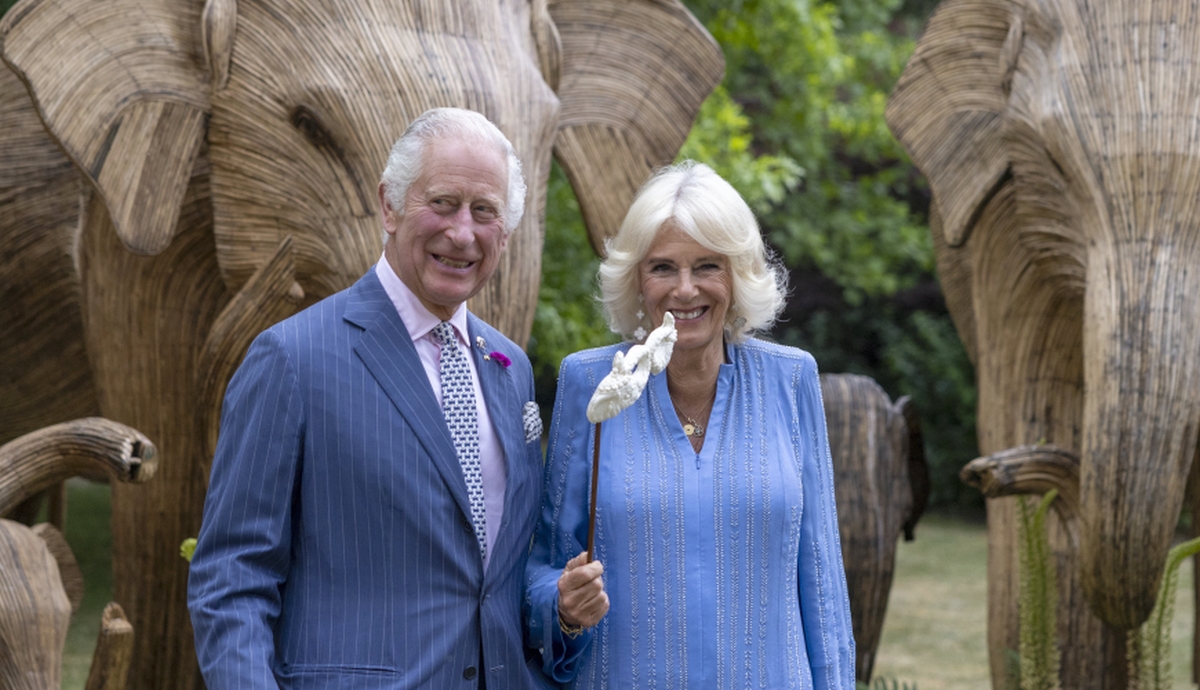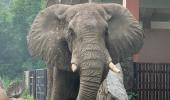
A huge herd of elephants -- 100 of them -- are arriving in Manhattan on Friday, which is also auspiciously the eve of Ganesh Chaturthi.
Nope, they are not journeying there from the jungles of India. Or from some enormous zoo.
But they are on an extended trip around the world and were last seen trumpeting about Bengaluru, and before that, in 2021, in central London, some of them in front of Buckingham Palace and might have startled the queen had she been in residence and peeped out her window, but she was at Windsor.

They are not real elephants, even though their size is similar and their impact is almost equal, but are artistically created in South India from plant derivatives and each one symbolises an actual elephant in the wild.
The story of these 100 elephants began a few years earlier and is rather special, so do listen in:
The habitat of the Indian elephant is being taken over by a weed-like vine called Lantana camara, one of the most aggressive, harmful flora species, which is like the mosquito of the plant world.
As their habitat shrinks -- and that of other animals too -- the poor elephant, who generally minds his own business, is forced to emerge from the jungle and can become a menace to society.
And yet India offers a remarkable tale of coexistence of people with animals, be it tigers, lions or elephants, especially in the Nilgiris, in Tamil Nadu, where some 150 wild elephants co-reside with 15 million people.
How can elephants get more space?
How can lantana be fought and elephants also protected
How can the wonderful coexistence between wild animals and humans in India be promoted (where, for instance, 75 per cent of an elephant's habitat has humans living in it) and further built up?
Very tough questions, because all environmental work, including education, requires huge funding and radical out-of-the-box solutions.
Questions that Ruth Ganesh, who specialises in creating art events around conservation themes, and Dr Tarsh Thekaekara, a researcher from Shola Trust, which is invested in Nilgiris nature conservation, were breaking their heads over some years ago.
Two conservationist minds are always better than one and they hit on the mammoth plan of producing giant elephants, ironically using the very same treacherous lantana (the more lantana is used for creating these elephants, the more will disapppear from the forests), and dispatching this herd of life-sized elephants to cities around the world to massively raise both awareness and funds for the protection of Nilgiri elephants.
Thus, the idea of The Great Elephant Migration was born. That's the title of the exhibition-cum-project that takes these elephants physically around the globe, while promoting the cause of elephants via talks, movies, roundtables, workshops, that coincide with the showing of the elephants.
Indigenous folks, some 200 of them, who live in the Nilgiris and belong to the Bettakurumba, Paniya, Kattunayakan and Soliga communities, are the artists and craftsmen who produced this stunning herd, using 150 tonnes of lantana. And the plant-based herd is slowly, ploddingly, travelling around the globe collecting funds for protecting elephant habitat.

Camilla's brother Mark Shand was a tireless campaigner for the survival of elephants and founded a charity called The Elephant Family.
Tragically, he died in 2014 after falling on a pavement in New York during an event to raise funds for the Elephant Family. Photograph: Kind courtesy: www.royal.uk
In 2021 these fantastic plant replicas of the pachyderm were in London. If you happened to wander near Green Park, St James Park or Berkeley Square you were likely to bump into an elephant.
Many of them were subsequently auctioned or bought by donors and have found permanent homes in Bahrain, Singapore, Hyderabad, New Delhi, among other places, and the money went to Coexistence Consortium, that strengthens the co-habiting of Indian villagers with wildlife, in myriad creative ways, firstly by helping expand forest cover and taking it back from intruders, including lantana.
Coexistence between man and beast is a perfect reflection of WHO's One Health refrain that calls for health of the environment.
Earlier this year the herd was in Bengaluru jungle-ising Cubbon Park and Lalbagh Botanical Gardens in March.
Now they are bound for New York and folks picking up their toffee-nut lattes or smoked salmon bagel sandwiches in the morning this Saturday might bump into any one of the herd in the Meatpacking District, towards the tip of Manhattan. Their appearance in Manhattan is sponsored by Designer Sabyasachi along with Elephant Family USA and others.
After spending more than a month in New York, the herd will move in October to a hot, humid place quite like the Nilgiris in summer, when it ventures to Miami and slowly the army of hundred will move westwards, through 2025, across the US, even meeting the indigenous people of North America at various halts in Blackfeet Nation and Buffalo Pastures in Montana, before finally reaching Los Angeles.
Transported, fittingly, in 100 electric trucks decorated with Indian lorry art, the hope is that this spectacle will raise loads of money for the elephants back home, for which these Lantana elephants are ambassadors, and at the same time educate people about the extremely pressing need for boosting animal-man harmony and co-existence in India and anywhere in the world that doesn't do it as well as India.











 © 2025
© 2025